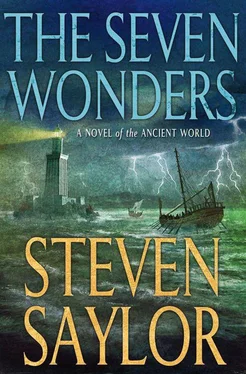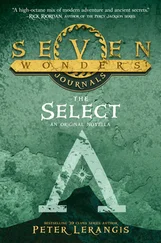Steven Saylor - The Seven Wonders
Здесь есть возможность читать онлайн «Steven Saylor - The Seven Wonders» весь текст электронной книги совершенно бесплатно (целиком полную версию без сокращений). В некоторых случаях можно слушать аудио, скачать через торрент в формате fb2 и присутствует краткое содержание. Год выпуска: 2012, Издательство: Macmillan, Жанр: Исторический детектив, на английском языке. Описание произведения, (предисловие) а так же отзывы посетителей доступны на портале библиотеки ЛибКат.
- Название:The Seven Wonders
- Автор:
- Издательство:Macmillan
- Жанр:
- Год:2012
- ISBN:нет данных
- Рейтинг книги:4 / 5. Голосов: 1
-
Избранное:Добавить в избранное
- Отзывы:
-
Ваша оценка:
- 80
- 1
- 2
- 3
- 4
- 5
The Seven Wonders: краткое содержание, описание и аннотация
Предлагаем к чтению аннотацию, описание, краткое содержание или предисловие (зависит от того, что написал сам автор книги «The Seven Wonders»). Если вы не нашли необходимую информацию о книге — напишите в комментариях, мы постараемся отыскать её.
The Seven Wonders — читать онлайн бесплатно полную книгу (весь текст) целиком
Ниже представлен текст книги, разбитый по страницам. Система сохранения места последней прочитанной страницы, позволяет с удобством читать онлайн бесплатно книгу «The Seven Wonders», без необходимости каждый раз заново искать на чём Вы остановились. Поставьте закладку, и сможете в любой момент перейти на страницу, на которой закончили чтение.
Интервал:
Закладка:
On our journey to see the Seven Wonders, Antipater and I saw much else along the way. As a poet, and a Greek, Antipater wished to pay homage to his great predecessors, so we stopped at Lesbos to visit the tomb of Sappho, and at Ios to see where Homer was buried. (Had we wished to see where Homer was born, we would have had to stop at almost every island in the Aegean Sea, since so many claimed that honor.)
We saw many remarkable places and things. None could match the Seven Wonders, though some came close. The Parthenon in Athens was certainly a marvel, as was the statue it housed, the chryselephantine Athena by Phidias; but, having seen the Temple of Artemis at Ephesus, and Phidias’s statue of Zeus at Olympia, I understood why those were on the list instead.
We stopped at the island of Delos to see the Keratonian Altar, which some claim should be counted among the Wonders. The name of the altar comes from the Greek kerata, “horns,” because it is made entirely of antlers ingeniously fitted together without any sort of binding by Apollo himself, who used the horns of deer slain by his sister Artemis. To be sure, the altar was an astonishing sight, but the visit was not pleasant. Under Roman rule, Delos had become one of the largest slave markets in the world, a place of misery and foul odors. Men came to Delos to purchase humans by the thousands, not to marvel at Apollo’s altar.
Of the many sites we visited other than the Seven Wonders, one stands out especially in my memory: the ruins of Corinth.
After seeing the Games at Olympia, we hired a driver and a mule-drawn wagon and headed east on the road that crosses the Peloponnesus, that vast peninsula that would be an island were it not for the slender strip of earth that connects it to the mainland. The road was a winding one, skirting mountains and passing through clefts in the rugged landscape. At last, toward the end of a long day of travel, Antipater told me that we were drawing near to the isthmus.
“At its narrowest, the isthmus is less than four miles wide,” he said. “A young fellow like you, Gordianus, might easily walk from the Gulf of Corinth on the north to the Gulf of Aegina on the south and back again in a single day, with time for a leisurely lunch beside this road, which at the isthmus links the two parts of Greece.”
“The route is certainly popular,” I said. Since leaving Olympia, we were constantly being passed by faster vehicles and travelers on horseback.
“Yes,” said Antipater, “there’s always a great deal of coming and going between the cities of the mainland-Athens, Thebes, and the rest-and the cities of the Peloponnesus, like Sparta and Argos. But the traffic is especially heavy now, and particularly in the easterly direction, since the Games at Olympia have just ended and all the athletes and spectators who poured into the Peloponnesus from the mainland are now heading home again. To do so by land, this is the only route.”
The winding road took a turn to the north, skirting a craggy peak to our left that erupted from the earth like a knuckle of sheer rock. As the road crested a hill, I suddenly saw the Gulf of Corinth straight ahead of us, and at the same time, far away to our right, I had my first glimpse of the Gulf of Aegina, a glimmer of silver beyond a long blue ridge.
“With the two gulfs so close on either side, and this road the only route from west to east, I should think this would be an ideal location for a city,” I said.
I was rather proud of this astute observation, and expected my old tutor to reward me with a smile. Instead, Antipater scowled. “Gordianus! Do you remember nothing of the geography I’ve taught you? Do you not realize where we are?”
I was eighteen, and a man, but Antipater had a way of speaking that made me feel I was a boy again.
He shook his head. “Fifty-four years ago, for the glory of Rome, Lucius Mummius utterly destroyed the city of Corinth and its people. And you, a Roman, don’t even know where Corinth was! Could you even find it on a map?”
“Of course I could,” I protested. “If that’s the Gulf of Corinth, to the north … and this winding road will eventually take us down to the Isthmus of Corinth, over that way … then…” I looked up at the craggy peak to our left. “Do you mean to say that’s Acrocorinth, the fortified mountain above the ancient city?” I squinted. “Now that I look, I do see the ruins of what might have been a line of walls up there. But that means the city must have been right over there, at the foot of that sheer cliff.”
I finally saw what had been in plain sight but invisible to my inattentive gaze-a distant jumble of stones and mounds of earth that were all that remained of the once proud city of Corinth. I felt a stirring of curiosity, but the ruins were a considerable distance from the road, and the late summer day was drawing to a close. The cart and the mules cast long shadows on the tall, dry grass. Antipater leaned forward to speak to the driver.
“Is there a place nearby where we can spend the night?”
The driver turned his head and looked at Antipater as if he were a madman. “Here, so near the ruins? Of course not! The Romans won’t allow so much as a vegetable stand to be built within a mile of the ancient walls, much less an inn. Besides, this place is…”
“Yes?” said Antipater. “Go on.”
“Haunted!” The man lowered his voice to a gruff whisper. “This is as close as I care to come to it. I dread passing by here, every time I make this trip.”
“Nevertheless, it’s my intention to have a closer look at the ruins,” said Antipater.
The driver snapped the reins and urged the mules to go faster. “You’ll be doing so without me, then. I tell you what-up ahead there’s a road that branches off to the left. That will take us down to the waterfront, to the old port of Lechaeum. There’s a Roman garrison there. The soldiers maintain a few of the docks and warehouses, strictly for military use. There’s not much of a town, just a few shops and a brothel that caters to the soldiers, but there’s a small inn with a tavern. You and the young Roman can spend the night there.”
“Where will you sleep?” I said.
“A pile of straw in the stable will be good enough for me,” said the driver.
“After a visit to the brothel, no doubt,” whispered Antipater.
“And tomorrow morning,” the driver went on, “if you’re still bent on visiting the ruins, I’ll drop you off. You can have a look at the place in broad daylight, and then I’ll come back and fetch you before nightfall.”
As the road tilted downward we saw the Gulf of Corinth before us, a broad sheet of gold lit by the westering sun. Eventually, the old port appeared as a silhouette of jumbled roofs against the shimmering water. As we drew nearer, the silhouette resolved into ramshackle structures. The inn was the first building we came to. It was a humble-looking place, but after a long day on the wagon I was glad to see it. No people were about. As the wagon came to a halt, a few dogs lying in the dusty street roused themselves and listlessly wagged their tails, looking worn out by the heat of the day but too hungry to miss an opportunity to beg. The driver shooed them away and went inside to make arrangements for us.
I looked around, but there was not much to see. The place had a melancholy, deserted air. All the nearby buildings had fallen into disrepair. Walls had given way. Roofs had fallen in.
“To think, Lechaeum was once one of the busiest ports in all Greece!” Antipater sighed. “The sister port on the other side of the isthmus is probably just as dilapidated.”
“But if the location is so ideal, why do the Romans not rebuild the ports, and reap the profits?”
Читать дальшеИнтервал:
Закладка:
Похожие книги на «The Seven Wonders»
Представляем Вашему вниманию похожие книги на «The Seven Wonders» списком для выбора. Мы отобрали схожую по названию и смыслу литературу в надежде предоставить читателям больше вариантов отыскать новые, интересные, ещё непрочитанные произведения.
Обсуждение, отзывы о книге «The Seven Wonders» и просто собственные мнения читателей. Оставьте ваши комментарии, напишите, что Вы думаете о произведении, его смысле или главных героях. Укажите что конкретно понравилось, а что нет, и почему Вы так считаете.










